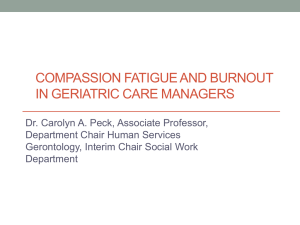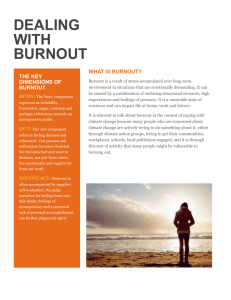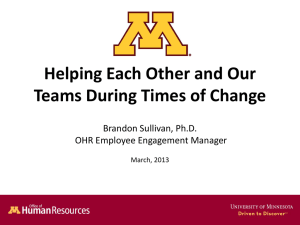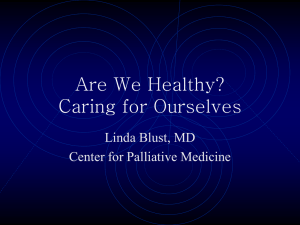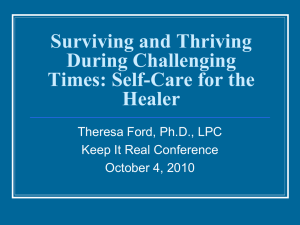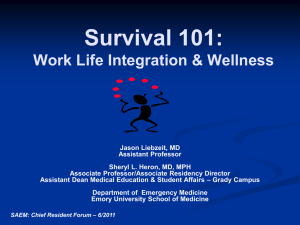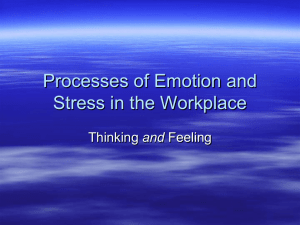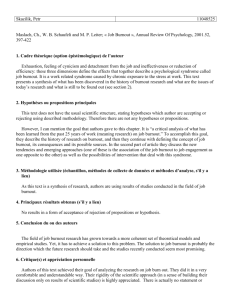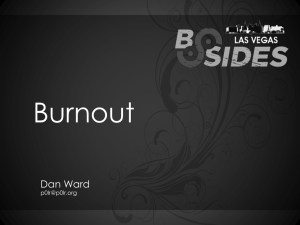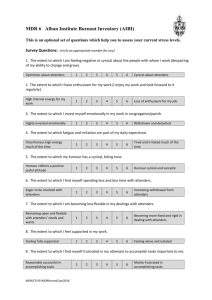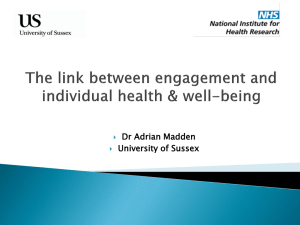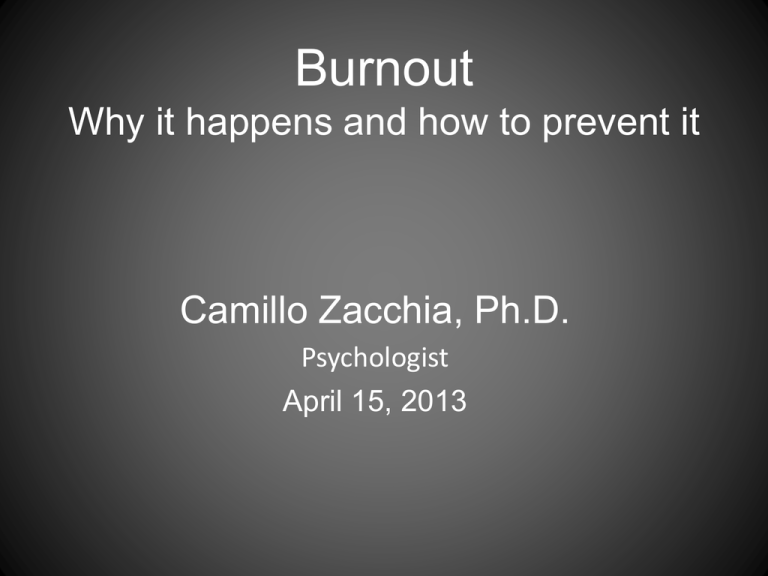
Burnout
Why it happens and how to prevent it
Camillo Zacchia, Ph.D.
Psychologist
April 15, 2013
Today’s outline
•
•
•
•
•
•
What is stress?
What is burnout?
Is it depression?
What’s the difference?
What causes burnout?
How do we deal with it?
Why do we have emotions?
• Emotions are calls to action: They are the
engines that drive us to act in ways that will protect us or
contribute to our survival.
Are you stressed?
What is stress?
• Stress is any form of challenge to the person
• It can be felt as anxiety when acute or as
general tension when diffuse and chronic
• When is something stressful?
• Novelty
• Unpredictability
• Threat to the ego
• Sense of control is lost
A stressor by any other name…
• No two people react the same way to a similar
stressor
• The stress response is an interaction between
the challenge itself and the individual’s
perception of his or her ability to respond to
it.
What is burnout?
Loss of function at work (or in life???):
(anxiety, frustration, sense of futility, agitation, fatigue, frustration,
impatience, pessimism, loss of productivity, etc…)
•
The term Burnout originally applied to workers in a
helping profession (doctors, nurses…)
•
Burnout is not a diagnosis. It is a popular term with no
standard definition.
What is Depression?
• Depressed mood or loss of pleasure
– Other indicators which may include:
•
•
•
•
•
•
•
Sleep problems
Trouble concentrating
Agitation
Fatigue
Recurrent thoughts of suicide or death
Changes in appetite
Feelings of worthlessness
• Must last for more than two weeks and cause
significant personal suffering or loss of function
What’s the difference?
• Burnout is a circumstance:
– It can happen when depressed.
– It can happen because of work conditions alone.
– It is influenced by many of the personality factors that cause
depression.
• Depression is a mood state:
– It can cause burnout
– It can be caused by burnout
– It is influenced by many of the personality factors that cause
burnout
– It can happen independently of working conditions
Causes of Depression and
Burnout
• Causes can be biological, situational or
psychological (or an interaction of all).
– Biological (genetic predisposition, biochemical
imbalance, innate temperament).
– Situational (e.g., loss of loved one, job loss,
debt, deadlines, workload)
– Psychological (Personality traits that can be
strengths and weaknesses depending on the
circumstances)
Disease
processes
Biochemical
factors
Who we are
and how we
see things
Our upbringing
and culture
Events big and small
X
The world around us
Innate temperament
Moods such
as depression
What causes burnout
• We expect too much of ourselves (internallygenerated pressures)
• Others expect too much of us (externallygenerated pressures)
• It’s never good enough
• Impostor syndrome
• We don’t have what it takes
Impostor syndrome
(poor self-esteem)
Internal pressures
Missing skills
(poor fit)
External pressures
Perfectionism
(it’s never good
enough)
Stress
What is it and how does it contribute to
burnout?
Number of
responsibilities
(i.e., challenges)
How we handle
X
them
(i.e., mastery over
challenges)
=
Stress
Internally-generated
pressures
Perfectionism
(high standards)
Lack of confidence
Inability to
recognize one’s
limits
Number of
responsibilities
X
How we
handle them
=
Stress
Inability to say
no
Externally-generated
pressures
Lack of support
Lack of necessary
skills
Additional causes of burnout
• Your boss is a jerk!
• You are the jerk!
When is a stressor not a stressor?: Core
beliefs (schemas) and you
•
•
•
•
Small Italian coffee
Do you remember my name?
The brilliant accountant
The stupid accountant
Dealing with burnout or
depression:
Making a change
•
•
•
•
Personality factors
Biochemistry
Circumstances
Attitude
This sucks! What are my
options?
• Step one: change it
• Step two: accept it
• Step three: reject it
So, how do we deal with
Burnout?
The $500 pair of shoes
Question the value of the
exchange
The reception desk
It’s not hard to tell who the good
workers are
The delay mechanism: Learning
to say no.
• The “Sure, no problem” guy
The marathon runner (it’s all about
the pace.)
When you are color blind, look
around you
• Seek out objective data
• Compare yourself on an equal level
• Judge others with the same numbers
If you want it done right, do it
yourself…
• If you want it done YOUR way, do it yourself.
– But first, make sure it IS the right way and the ONLY
right way.
• If you want the IMPORTANT things done right,
then do ONLY the important things yourself.
Stimulus control and clocks
Don’t take advantage of the
“go to” guy
Mental Health Info:
www.douglas.qc.ca
Blog:
www.blog.douglas.qc.ca/psychospeak
Questions ?
camillo.zacchia@douglas.mcgill.ca
Website:
drzacchia.com

